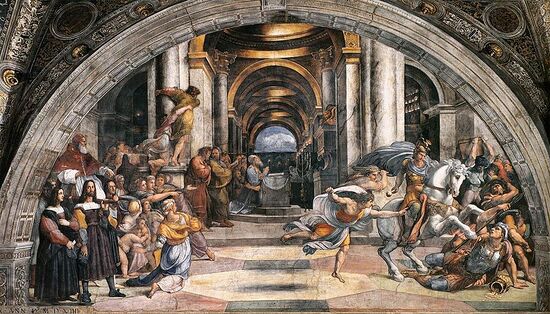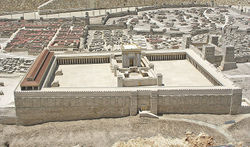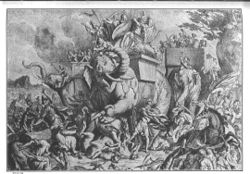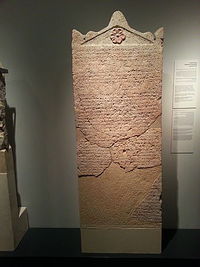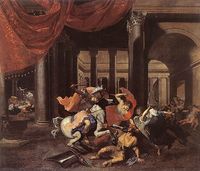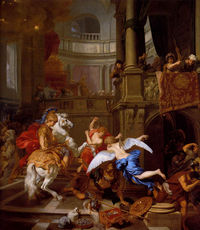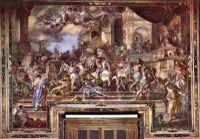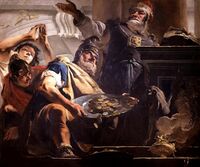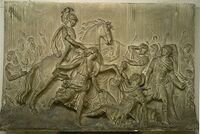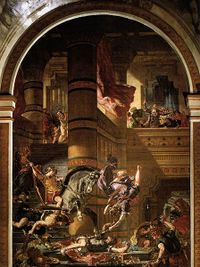Category:Heliodorus (subject)
|
Heliodorus / Heliodorus' Mission
Heliodorus -- Overview The Heliodorus Stele -- a Greek inscription, discovered in northern Israel in the 1960s and displayed since 2007 at the Israel Museum in Jerusalem -- preserves the letter of appointment by King Seleucus IV Philopator to Heliodorus, as overseer of the sanctuaries within the Seleucid province of Koile-Syria and Phoinike, including the Land of Israel. The king's letter is introduced by two short notes, dating from the late summer 178 BCE, transmitting the directives of the King from Heliodorus to his subordinates. After the disastrous battle of Magnesia in 189 BCE, the Seleucid administration needed money to pay the tribute to Rome. An opportunity was offered by a certain Simon, a political opponent of the High Priest Onias III, who before the governor Apollonius denounced the presence of private funds in the treasure of the Temple of Jerusalem. The attempt to seize those funds miserably failed; the High Priest Onias III was strong enough to beat the Seleucid envoy, Heliodorus, bribe him, and send him empty-handed back to the King. The episode is recorded in Jewish sources--2 Maccabees (3:1-40) and 4 Maccabees (4:1-14, where however the king's official who went to Jerusalem is Apollonius, the governor of the province, not Heliodorus); both sources attribute the favorable outcome to the intervention of divine forces. Appian ("De Rebus Syriacis," 45) states that in 175 BCE Seleucus IV Philopator was murdered by one of his courtiers (τὶς τῶν περὶ τὴν όνλὴν), named Heliodorus, who attempted to seize the Syrian crown, but was eventually executed by Seleucus' brother and successor Antiochus IV Epiphanes. It is likely but not certain that this was the same Heliodorus. For some time the episode of the Expulsion of Heliodorus from the Temple became very popular in Roman Catholic iconography, since Pope Julius II wanted Raphael to depict it in his rooms in the Vatican as a symbol of the sanctity and inviolability of Church property. Gabriele Boccaccini, University of Michigan Related categories External links
Ancient Sources Heliodorus is mentioned in a 2nd century BCE stele and in the Second Book of Maccabees, and is alluded in the book of Daniel. 4 Maccabees reports the same event as 2 Maccabees, but attributes the incident to Apollonius without mentioning Heliodorus. Second Book of Maccabees2 Maccabees 3:1-40 (NRSV) -- [1] While the holy city was inhabited in unbroken peace and the laws were strictly observed because of the piety of the high priest Onias and his hatred of wickedness, [2] it came about that the kings themselves honoured the place and glorified the temple with the finest presents, [3] even to the extent that King Seleucus of Asia defrayed from his own revenues all the expenses connected with the service of the sacrifices. [4] But a man named Simon, of the tribe of Benjamin, who had been made captain of the temple, had a disagreement with the high priest about the administration of the city market. [5] Since he could not prevail over Onias, he went to Apollonius of Tarsus, who at that time was governor of Coelesyria and Phoenicia, [6] and reported to him that the treasury in Jerusalem was full of untold sums of money, so that the amount of the funds could not be reckoned, and that they did not belong to the account of the sacrifices, but that it was possible for them to fall under the control of the king. [7] When Apollonius met the king, he told him of the money about which he had been informed. The king chose Heliodorus, who was in charge of his affairs, and sent him with commands to effect the removal of the reported wealth. [8] Heliodorus at once set out on his journey, ostensibly to make a tour of inspection of the cities of Coelesyria and Phoenicia, but in fact to carry out the king’s purpose. [9] When he had arrived at Jerusalem and had been kindly welcomed by the high priest of the city, he told about the disclosure that had been made and stated why he had come, and he inquired whether this really was the situation. [10] The high priest explained that there were some deposits belonging to widows and orphans, [11] and also some money of Hyrcanus son of Tobias, a man of very prominent position, and that it totalled in all four hundred talents of silver and two hundred of gold. To such an extent the impious Simon had misrepresented the facts. [12] And he said that it was utterly impossible that wrong should be done to those people who had trusted in the holiness of the place and in the sanctity and inviolability of the temple that is honoured throughout the whole world. [13] But Heliodorus, because of the orders he had from the king, said that this money must in any case be confiscated for the king’s treasury. [14] So he set a day and went in to direct the inspection of these funds. There was no little distress throughout the whole city. [15] The priests prostrated themselves before the altar in their priestly vestments and called towards heaven upon him who had given the law about deposits, that he should keep them safe for those who had deposited them. [16] To see the appearance of the high priest was to be wounded at heart, for his face and the change in his colour disclosed the anguish of his soul. [17] For terror and bodily trembling had come over the man, which plainly showed to those who looked at him the pain lodged in his heart. [18] People also hurried out of their houses in crowds to make a general supplication because the holy place was about to be brought into dishonour. [19] Women, girded with sackcloth under their breasts, thronged the streets. Some of the young women who were kept indoors ran together to the gates, and some to the walls, while others peered out of the windows. [20] And holding up their hands to heaven, they all made supplication. [21] There was something pitiable in the prostration of the whole populace and the anxiety of the high priest in his great anguish. [22] While they were calling upon the Almighty Lord that he would keep what had been entrusted safe and secure for those who had entrusted it, [23] Heliodorus went on with what had been decided. [24] But when he arrived at the treasury with his bodyguard, then and there the Sovereign of spirits and of all authority caused so great a manifestation that all who had been so bold as to accompany him were astounded by the power of God, and became faint with terror. [25] For there appeared to them a magnificently caparisoned horse, with a rider of frightening mien; it rushed furiously at Heliodorus and struck at him with its front hoofs. Its rider was seen to have armour and weapons of gold. [26] Two young men also appeared to him, remarkably strong, gloriously beautiful and splendidly dressed, who stood on either side of him and flogged him continuously, inflicting many blows on him. [27] When he suddenly fell to the ground and deep darkness came over him, his men took him up, put him on a stretcher, [28] and carried him away—this man who had just entered the aforesaid treasury with a great retinue and all his bodyguard but was now unable to help himself. They recognized clearly the sovereign power of God. [29] While he lay prostrate, speechless because of the divine intervention and deprived of any hope of recovery, [30] they praised the Lord who had acted marvellously for his own place. And the temple, which a little while before was full of fear and disturbance, was filled with joy and gladness, now that the Almighty Lord had appeared. [31] Some of Heliodorus’s friends quickly begged Onias to call upon the Most High to grant life to one who was lying quite at his last breath. [32] So the high priest, fearing that the king might get the notion that some foul play had been perpetrated by the Jews with regard to Heliodorus, offered sacrifice for the man’s recovery. [33] While the high priest was making an atonement, the same young men appeared again to Heliodorus dressed in the same clothing, and they stood and said, ‘Be very grateful to the high priest Onias, since for his sake the Lord has granted you your life. [34] And see that you, who have been flogged by heaven, report to all people the majestic power of God.’ Having said this they vanished. [35] Then Heliodorus offered sacrifice to the Lord and made very great vows to the Saviour of his life, and having bidden Onias farewell, he marched off with his forces to the king. [36] He bore testimony to all concerning the deeds of the supreme God, which he had seen with his own eyes. [37] When the king asked Heliodorus what sort of person would be suitable to send on another mission to Jerusalem, he replied, [38] ‘If you have any enemy or plotter against your government, send him there, for you will get him back thoroughly flogged, if he survives at all; for there is certainly some power of God about the place. [39] For he who has his dwelling in heaven watches over that place himself and brings it aid, and he strikes and destroys those who come to do it injury.’ [40] This was the outcome of the episode of Heliodorus and the protection of the treasury. Cf. Book of DanielDan 11:20 (NRSV) -- He [=King Seleucus IV] shall send an official [=Heliodorus?] for the glory of the kingdom Cf. Fourth Book of Maccabees[1] Now there was a certain Simon, a political opponent of the noble and good man, Onias, who then held the high priesthood for life. When despite all manner of slander he was unable to injure Onias in the eyes of the nation, he fled the country with the purpose of betraying it. [2] So he came to Apollonius, governor of Syria, Phoenicia, and Cilicia, and said, [3] "I have come here because I am loyal to the king's government, to report that in the Jerusalem treasuries there are deposited tens of thousands in private funds, which are not the property of the temple but belong to King Seleucus." [4] When Apollonius learned the details of these things, he praised Simon for his service to the king and went up to Seleucus to inform him of the rich treasure. [5] On receiving authority to deal with this matter, he proceeded quickly to our country accompanied by the accursed Simon and a very strong military force. [6] He said that he had come with the king's authority to seize the private funds in the treasury. [7] The people indignantly protested his words, considering it outrageous that those who had committed deposits to the sacred treasury should be deprived of them, and did all that they could to prevent it. [8] But, uttering threats, Apollonius went on to the temple. [9] While the priests together with women and children were imploring God in the temple to shield the holy place that was being treated so contemptuously, [10] and while Apollonius was going up with his armed forces to seize the money, angels on horseback with lightning flashing from their weapons appeared from heaven, instilling in them great fear and trembling. [11] Then Apollonius fell down half dead in the temple area that was open to all, stretched out his hands toward heaven, and with tears besought the Hebrews to pray for him and propitiate the wrath of the heavenly army. [12] For he said that he had committed a sin deserving of death, and that if he were delivered he would praise the blessedness of the holy place before all people. [13] Moved by these words, Onias the high priest, although otherwise he had scruples about doing so, prayed for him lest King Seleucus suppose that Apollonius had been overcome by human treachery and not by divine justice. [14] So Apollonius, having been preserved beyond all expectations, went away to report to the king what had happened to him. |
The Heliodorus Stele Dorymenes to Diophanes greetings: The copy of the letter given us by Heliodorus who is in charge of the affairs is enclosed. You will do well therefore if you take care that everything is carried out according to the instructions. Year 134, 22 of the month of Gorpiaius [=August 178 BCE] Heliodorus to Dorymenes his brother greetings:The copy of the order given us by the king concerning Olympiodorus is placed below. You will do well therefore if you follow the instructions. Year 134, 20(?) of the month of Gorpiaius [=August 178 BCE] King Seleucus to Heliodorus his brother greetings: Taking the utmost consideration for the safety of our subjects, and thinking it to be of the greatest good for the affairs in our realm when those living in our kingdom manage their lives without fear, and at the same time realizing that nothing can enjoy a fitting prosperity without the good will of the gods, we have given orders from the outset that the sanctuaries founded in the other satrapies receive the traditional honors with the care befitting them. But since the affairs in Koile-Syria and Phoinike stand in need of the appointment of someone to take care of these (i.e. sanctuaries)... Olympiodorus... [trans. Hannah Cotton-Paltiel and Michael Woerrle]
Some Works of Art
|
Pages in category "Heliodorus (subject)"
The following 7 pages are in this category, out of 7 total.
1
- Expulsion of Heliodorus from the Temple (1512 Raphael), art
- Expulsion of Heliodorus from the Temple (1662 Flémal), art
- Expulsion of Heliodorus from the Temple (1674 Lairesse), art
- Expulsion of Heliodorus from the Temple (1725 Solimena), art
- Heliodorus and Onias (1726 Tiepolo), art
- Heliodorus Driven out of the Temple (1791 Thorvaldsen), art
- Expulsion of Heliodorus from the Temple (1861 Delacroix), art
